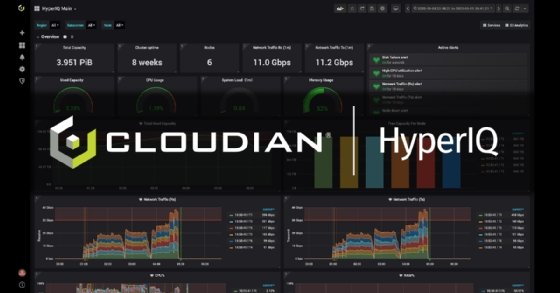
Getty Images/iStockphoto
Cloudian updates HyperIQ with security, simplicity features
Cloudian HyperIQ added management and security features in its latest update to help customers handle large-scale, distributed storage infrastructure.
Cloudian updated its HyperIQ storage observability and analytics tool this week to make managing complex, geographically dispersed HyperStore object storage environments easier.
The latest release added replication monitoring across HyperStore clusters, multi-cluster management using a single instance of HyperIQ and single sign-on to the tool for anyone with appropriate privileges.
Federated management was one of the most asked-for capabilities among HyperIQ customers, according to Larry Meese, vice president of products and solutions at Cloudian. Before this update, every Cloudian HyperStore or HyperFile NAS controller instance required its own dedicated instance of HyperIQ.
"With federated management, it becomes a lot less complex to manage HyperIQ," Meese said, adding that a single HyperIQ instance can manage up to 16 Cloudian storage clusters.
The update also added the ability to obtain transaction details on Amazon S3 buckets. This provides some measure of defense against ransomware, Meese said, as it enables customers to log and audit all attempts to access or delete data in S3 buckets.
Cloudian HyperIQ is a monitoring tool first released in June 2020 with the goal of providing useful, actionable information on customers' Cloudian infrastructure. It gathers information such as the speed at which data is read and written, the storage capacity of each node, and user activity such as API usage or cloud transactions. Customers can use this information to perform predictive maintenance, such as replacing nodes that are about to fail based on an anomalous drop in performance or adding more nodes to a cluster as capacity thresholds are crossed.

Storage environments are getting bigger and more dispersed, making it harder for customers to keep tabs on their infrastructure's health, Meese said. This week's update, he said, makes that job easier by reducing the number of HyperIQ instances an administrator must keep track of and by enabling admins to build an "Allow List" via single sign-on that grants HyperIQ access to other IT teams, such as security.
"You can give access to everything that's happening in HyperIQ, but everything that's happening is a lot," Meese said. "The alert fatigue was something we had to address, and the Allow List is a step in that [direction]."
HyperIQ has APIs that allow third-party tools such as Slack and Splunk to get its data, but integrations with security tools are still on the roadmap, according to Meese. Indexing and searching Cloudian environments will also be available sometime next year, as well as some automation features.
Security everywhere
Two of the features in Cloudian HyperIQ's latest update deal with security, a focus that's becoming the norm for storage vendors due to the uptick in ransomware attacks, said Scott Sinclair, a senior analyst at Enterprise Strategy Group, a division of TechTarget. In the past, a storage administrator wouldn't worry about access logs, but ransomware attacks have pushed security features into products overseen by people outside of traditional security teams.
"All facets of IT are making security a priority," Sinclair said.
For large companies, cross-organization collaboration on a security strategy is still a challenge, Sinclair added, and HyperIQ's added single sign-on feature is a good way to address this. An alert to possible unauthorized access isn't necessarily useful in the hands of an IT admin, but with single sign-on, companies can ensure that alert gets to someone in security.
Outside of cyberthreats, storage vendors are acknowledging that customer environments are becoming larger and more distributed, leading to complexity and creating demand for tools that can help customers monitor and optimize their storage infrastructure, Sinclair said.
"Companies are figuring out they need better tools to quickly recognize and respond to issues," he said.
Innovation in storage is no longer about providing a "nice box to put stuff in," but giving customers the insight to use, secure and govern their data, Sinclair added. He noted that Dell EMC has a similar product to Cloudian HyperIQ called CloudIQ, which monitors Dell EMC storage systems, and Hitachi Vantara has analytics capabilities, as well.
Johnny Yu covers enterprise data protection news for TechTarget's Storage sites SearchDataBackup and SearchDisasterRecovery. Before joining TechTarget in June 2018, he wrote for USA Today's consumer product review site Reviewed.com.





